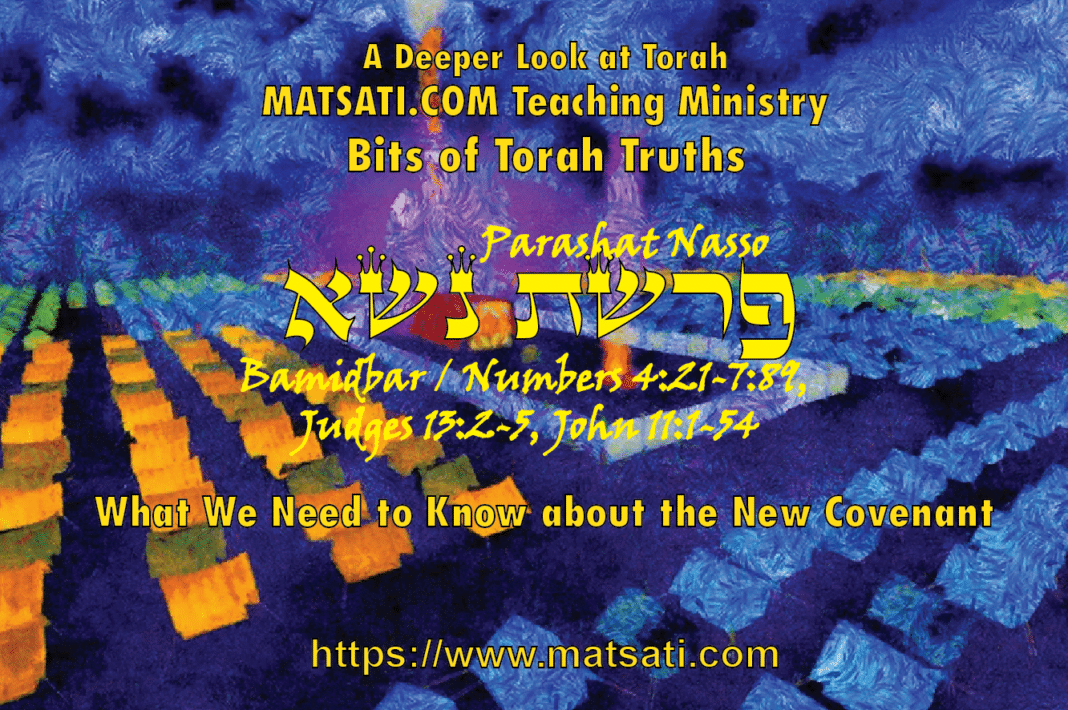In this week’s Torah portion, we read about the numbering of the Levites (Bamidbar / Numbers 4:21-49), to send the unclean people outside the camp (5:1-4), how a man is to make confession and restitution (5:5-10), the test for adultery (5:11-31),the Nazarite vow (6:1-21), the Aaronic blessing (6:22-27), and the offerings during Tabernacle consecration (7:1-89). It is interesting the organization of this week’s portion. We note how the numbering of the Levites was separate from the other tribes. Then we read about the unclean people in Bamidbar / Numbers 5:1-3, א וַיְדַבֵּ֥ר יְהוָ֖ה אֶל־מֹשֶׁ֥ה לֵּאמֹֽר׃ ב צַ֚ו אֶת־בְּנֵ֣י יִשְׂרָאֵ֔ל וִֽישַׁלְּחוּ֙ מִן־הַֽמַּחֲנֶ֔ה כָּל־צָר֖וּעַ וְכָל־זָ֑ב וְכֹ֖ל טָמֵ֥א לָנָֽפֶשׁ׃ ג מִזָּכָ֤ר עַד־נְקֵבָה֙ תְּשַׁלֵּ֔חוּ אֶל־מִח֥וּץ לַֽמַּחֲנֶ֖ה תְּשַׁלְּח֑וּם וְלֹ֤א יְטַמְּאוּ֙ אֶת־מַ֣חֲנֵיהֶ֔ם אֲשֶׁ֥ר אֲנִ֖י שֹׁכֵ֥ן בְּתוֹכָֽם׃ 5:1 The Lord spoke to Moses, saying, 5:2 “Command the people of Israel that they put out of the camp everyone who is leprous or has a discharge and everyone who is unclean through contact with the dead. 5:3 You shall put out both male and female, putting them outside the camp, that they may not defile their camp, in the midst of which I dwell.” (ESV) Here the Lord commands Moshe to instruct the people to remove three types of people, (i) כָּל־צָר֖וּעַ (ii) וְכָל־זָ֑ב, and (iii) וְכֹ֖ל טָמֵ֥א לָנָֽפֶשׁ (all with tzarua, all with discharge, and all who is unclean due to a soul / life לָנָֽפֶשׁ). These persons were to be sent out of the camp (וִֽישַׁלְּחוּ֙ מִן־הַֽמַּחֲנֶ֔ה). The next verse says מִזָּכָ֤ר עַד־נְקֵבָה֙ תְּשַׁלֵּ֔חוּ אֶל־מִח֥וּץ לַֽמַּחֲנֶ֖ה “male or female are to be sent outside the camp.” Note how the Torah does not make a distinction between a child or an adult, and it doesn’t matter whether one is male or female. It is interesting how Rashi describes the camp and the location of those who have one of these three things are sent.
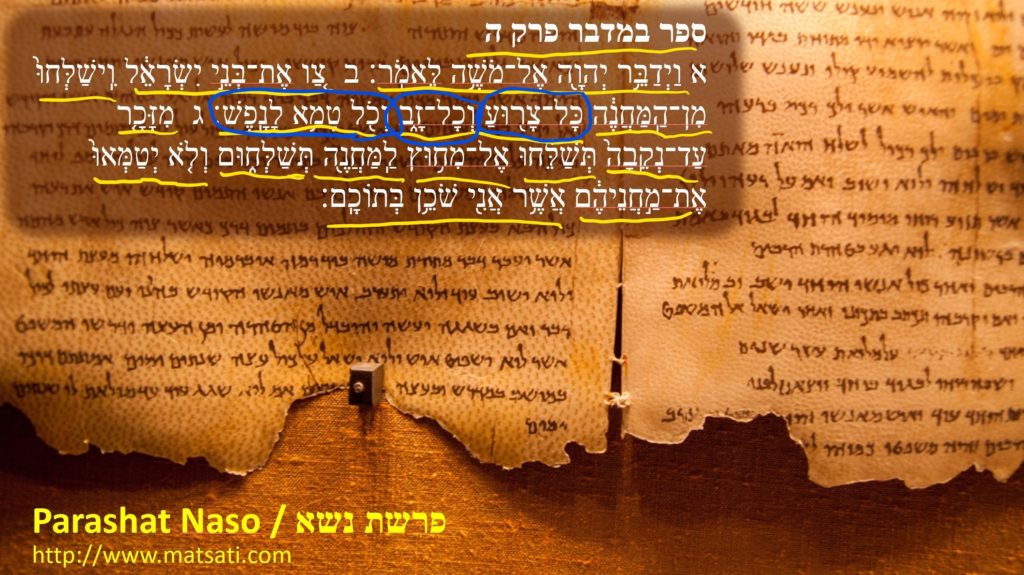
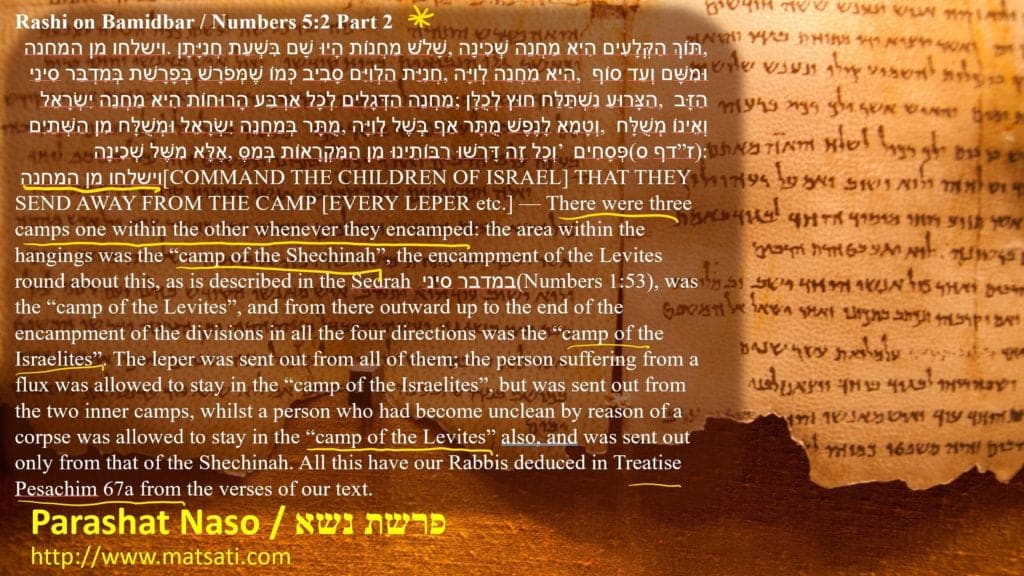
Rashi on Bamidbar / Numbers 5:2 Part 2
וישלחו מן המחנה. שָׁלֹשׁ מַחֲנוֹת הָיוּ שָׁם בִּשְׁעַת חֲנִיָּתָן, תּוֹךְ הַקְּלָעִים הִיא מַחֲנֵה שְׁכִינָה, חֲנִיַּת הַלְוִיִּם סָבִיב כְּמוֹ שֶׁמְּפֹרָשׁ בְּפָרָשַׁת בְּמִדְבַּר סִינַי, הִיא מַחֲנֵה לְוִיָּה, וּמִשָּׁם וְעַד סוֹף מַחֲנֵה הַדְּגָלִים לְכָל אַרְבַּע הָרוּחוֹת הִיא מַחֲנֵה יִשְׂרָאֵל; הַצָּרוּעַ נִשְׁתַּלַּח חוּץ לְכֻלָּן, הַזָּב מֻתָּר בְּמַחֲנֵה יִשְׂרָאֵל וּמְשֻׁלָּח מִן הַשְּׁתַיִם, וְטָמֵא לָנֶפֶשׁ מֻתָּר אַף בְּשֶׁל לְוִיָּה, וְאֵינוֹ מְשֻׁלָּח אֶלָּא מִשֶּׁל שְׁכִינָה, וְכָל זֶה דָּרְשׁוּ רַבּוֹתֵינוּ מִן הַמִּקְרָאוֹת בְּמַסֶּ’ פְּסָחִים (דף ס”ז):
וישלחו מן המחנה [COMMAND THE CHILDREN OF ISRAEL] THAT THEY SEND AWAY FROM THE CAMP [EVERY LEPER etc.] — There were three camps one within the other whenever they encamped: the area within the hangings was the “camp of the Shechinah”, the encampment of the Levites round about this, as is described in the Sedrah במדבר סיני (Numbers 1:53), was the “camp of the Levites”, and from there outward up to the end of the encampment of the divisions in all the four directions was the “camp of the Israelites”. The leper was sent out from all of them; the person suffering from a flux was allowed to stay in the “camp of the Israelites”, but was sent out from the two inner camps, whilst a person who had become unclean by reason of a corpse was allowed to stay in the “camp of the Levites” also, and was sent out only from that of the Shechinah. All this have our Rabbis deduced in Treatise Pesachim 67a from the verses of our text.
Rashi claims there were three camps that surrounded the Mishkhan (Tabernacle), first the Levites, then the camp of the Israelites. The third camp consisted of these who were unclean. If we think about this for a moment, why would this third group be considered a camp? Were there that many people who had a skin malady or who were unclean due to touching the dead? This is a significant point here that Rashi is drawing out for us in relation to what Yeshua has to say concerning these things. It was after Moshe had erected the Mishkhan (Tabernacle) He commanded the impure to be sent away from the camp in order that the camp may be holy, separated, and fit for the Divine Presence to reside. The rabbis say this command is applicable immediately and it was for all generations. (Ramban on Bamidbar / Numbers 5:2 Part 1) Ramban believes that through the numbering of the children of Israel God separated them from the mixed multitude. We note something as Bamidbar / Numbers 5:3 states, וְלֹ֤א יְטַמְּאוּ֙ אֶת־מַ֣חֲנֵיהֶ֔ם אֲשֶׁ֥ר אֲנִ֖י שֹׁכֵ֥ן “they shall not defile their camp in which I dwell.” The kind of defilement that is mentioned here is related to ritual impurity (יְטַמְּאוּ֙). If we compare this to the NT text, to something Yeshua said according to Mark 7:20, הוֹסִיף וְאָמַר׃ ״הַיּוֹצֵא מִן הָאָדָם –– זֶה מְטַמֵּא אֶת הָאָדָם, “he added saying, what comes out of a man, this defiled the man.” Notice in the Hebrew translation Yeshua uses the same word for ritual impurity (מְטַמֵּא). If we consider the uncleanness (מְטַמֵּא) of our sins and how this leads to death, there is a parallel here to being unclean by reason of death. If we combine this with what we are reading in Parashat Naso, this would make this third came quite significantly large thinking about it in this way! What we read in Parashat Naso this week has significant application for our lives today!
The verses we are looking at for this week are from Bamidbar / Numbers 5:1-10.
ספר במדבר פרק ה
א וַיְדַבֵּ֥ר יְהוָ֖ה אֶל־מֹשֶׁ֥ה לֵּאמֹֽר׃ ב צַ֚ו אֶת־בְּנֵ֣י יִשְׂרָאֵ֔ל וִֽישַׁלְּחוּ֙ מִן־הַֽמַּחֲנֶ֔ה כָּל־צָר֖וּעַ וְכָל־זָ֑ב וְכֹ֖ל טָמֵ֥א לָנָֽפֶשׁ׃ ג מִזָּכָ֤ר עַד־נְקֵבָה֙ תְּשַׁלֵּ֔חוּ אֶל־מִח֥וּץ לַֽמַּחֲנֶ֖ה תְּשַׁלְּח֑וּם וְלֹ֤א יְטַמְּאוּ֙ אֶת־מַ֣חֲנֵיהֶ֔ם אֲשֶׁ֥ר אֲנִ֖י שֹׁכֵ֥ן בְּתוֹכָֽם׃ ד וַיַּֽעֲשׂוּ־כֵן֙ בְּנֵ֣י יִשְׂרָאֵ֔ל וַיְשַׁלְּח֣וּ אוֹתָ֔ם אֶל־מִח֖וּץ לַֽמַּחֲנֶ֑ה כַּאֲשֶׁ֨ר דִּבֶּ֤ר יְהוָה֙ אֶל־מֹשֶׁ֔ה כֵּ֥ן עָשׂ֖וּ בְּנֵ֥י יִשְׂרָאֵֽל׃ פ ה וַיְדַבֵּ֥ר יְהוָ֖ה אֶל־מֹשֶׁ֥ה לֵּאמֹֽר׃ ו דַּבֵּר֮ אֶל־בְּנֵ֣י יִשְׂרָאֵל֒ אִ֣ישׁ אֽוֹ־אִשָּׁ֗ה כִּ֤י יַעֲשׂוּ֙ מִכָּל־חַטֹּ֣את הָֽאָדָ֔ם לִמְעֹ֥ל מַ֖עַל בַּיהוָ֑ה וְאָֽשְׁמָ֖ה הַנֶּ֥פֶשׁ הַהִֽוא׃ ז וְהִתְוַדּ֗וּ אֶֽת־חַטָּאתָם֮ אֲשֶׁ֣ר עָשׂוּ֒ וְהֵשִׁ֤יב אֶת־אֲשָׁמוֹ֙ בְּרֹאשׁ֔וֹ וַחֲמִישִׁת֖וֹ יֹסֵ֣ף עָלָ֑יו וְנָתַ֕ן לַאֲשֶׁ֖ר אָשַׁ֥ם לֽוֹ׃ ח וְאִם־אֵ֨ין לָאִ֜ישׁ גֹּאֵ֗ל לְהָשִׁ֤יב הָאָשָׁם֙ אֵלָ֔יו הָאָשָׁ֛ם הַמּוּשָׁ֥ב לַיהוָ֖ה לַכֹּהֵ֑ן מִלְּבַ֗ד אֵ֚יל הַכִּפֻּרִ֔ים אֲשֶׁ֥ר יְכַפֶּר־בּ֖וֹ עָלָֽיו׃ ט וְכָל־תְּרוּמָ֞ה לְכָל־קָדְשֵׁ֧י בְנֵי־יִשְׂרָאֵ֛ל אֲשֶׁר־יַקְרִ֥יבוּ לַכֹּהֵ֖ן ל֥וֹ יִהְיֶֽה׃ י וְאִ֥ישׁ אֶת־קֳדָשָׁ֖יו ל֣וֹ יִהְי֑וּ אִ֛ישׁ אֲשֶׁר־יִתֵּ֥ן לַכֹּהֵ֖ן ל֥וֹ יִהְיֶֽה׃
Bamidbar / Numbers 5:1-10
5:1 The Lord spoke to Moses, saying, 5:2 “Command the people of Israel that they put out of the camp everyone who is leprous or has a discharge and everyone who is unclean through contact with the dead. 5:3 You shall put out both male and female, putting them outside the camp, that they may not defile their camp, in the midst of which I dwell.” 5:4 And the people of Israel did so, and put them outside the camp; as the Lord said to Moses, so the people of Israel did. 5:5 And the Lord spoke to Moses, saying, 5:6 “Speak to the people of Israel, When a man or woman commits any of the sins that people commit by breaking faith with the Lord, and that person realizes his guilt, 5:7 he shall confess his sin that he has committed. And he shall make full restitution for his wrong, adding a fifth to it and giving it to him to whom he did the wrong. 5:8 But if the man has no next of kin to whom restitution may be made for the wrong, the restitution for wrong shall go to the Lord for the priest, in addition to the ram of atonement with which atonement is made for him. 5:9 And every contribution, all the holy donations of the people of Israel, which they bring to the priest, shall be his. 5:10 Each one shall keep his holy donations: whatever anyone gives to the priest shall be his.” (ESV)
We read according to Bamidbar / Numbers 5:1-3, the following: א וַיְדַבֵּ֥ר יְהוָ֖ה אֶל־מֹשֶׁ֥ה לֵּאמֹֽר׃ ב צַ֚ו אֶת־בְּנֵ֣י יִשְׂרָאֵ֔ל וִֽישַׁלְּחוּ֙ מִן־הַֽמַּחֲנֶ֔ה כָּל־צָר֖וּעַ וְכָל־זָ֑ב וְכֹ֖ל טָמֵ֥א לָנָֽפֶשׁ׃ ג מִזָּכָ֤ר עַד־נְקֵבָה֙ תְּשַׁלֵּ֔חוּ אֶל־מִח֥וּץ לַֽמַּחֲנֶ֖ה תְּשַׁלְּח֑וּם וְלֹ֤א יְטַמְּאוּ֙ אֶת־מַ֣חֲנֵיהֶ֔ם אֲשֶׁ֥ר אֲנִ֖י שֹׁכֵ֥ן בְּתוֹכָֽם׃ 5:1 The Lord spoke to Moses, saying, 5:2 “Command the people of Israel that they put out of the camp everyone who is leprous or has a discharge and everyone who is unclean through contact with the dead. 5:3 You shall put out both male and female, putting them outside the camp, that they may not defile their camp, in the midst of which I dwell.” (ESV) Here the Lord commands Moshe to instruct the people to remove three types of people and we learn based upon Yeshua’s words this command is very significant. The reason being as this is related to the gospel message that was given to the people in the wilderness (see Hebrews 4). This is God dwelling in our midst, as Paul wrote is the gospel message of God sending His Holy Spirit to dwell in our hearts through faith in His Son Yeshua the Messiah! (John 14, 1 Corinthians 3:16-17) This comparison suggests that there must be a miracle of cleansing in order for the Spirit and Power of God to dwell in our midst. In the discussion on sending the impure out, this reminds us of something written in the book of Hebrews that Yeshua acomplished. The verses we want to look at specifically are from Hebrews 1:1-4.
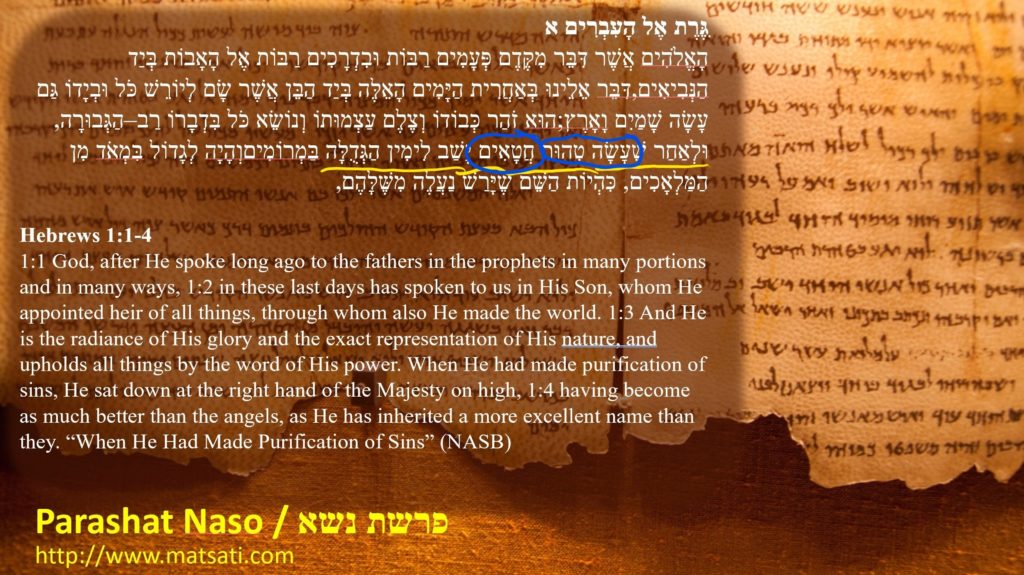
אִגֶּרֶת אֶל הָעִבְרִים א
הָאֱלֹהִים אֲשֶׁר דִּבֵּר מִקֶּדֶם פְּעָמִים רַבּוֹת וּבִדְרָכִים רַבּוֹת אֶל הָאָבוֹת בְּיַד הַנְּבִיאִים,דִּבֵּר אֵלֵינוּ בְּאַחֲרִית הַיָּמִים הָאֵלֶּה בְּיַד הַבֵּן אֲשֶׁר שָׂם לְיוֹרֵשׁ כֹּל וּבְיָדוֹ גַּם עָשָׂה שָׁמַיִם וָאָרֶץ;הוּא זֹהַר כְּבוֹדוֹ וְצֶלֶם עַצְמוּתוֹ וְנוֹשֵׂא כֹּל בִּדְבָרוֹ רַב–הַגְּבוּרָה, וּלְאַחַר שֶׁעָשָׂה טִהוּר חֲטָאִים יָשַׁב לִימִין הַגְּדֻלָּה בַּמְרוֹמִיםוְהָיָה לְגָדוֹל בִּמְאֹד מִן הַמַּלְאָכִים, כִּהְיוֹת הַשֵּׁם שֶׁיָּרַשׁ נַעֲלֶה מִשֶּׁלָּהֶם,
Hebrews 1:1-4
1:1 God, after He spoke long ago to the fathers in the prophets in many portions and in many ways, 1:2 in these last days has spoken to us in His Son, whom He appointed heir of all things, through whom also He made the world. 1:3 And He is the radiance of His glory and the exact representation of His nature, and upholds all things by the word of His power. When He had made purification of sins, He sat down at the right hand of the Majesty on high, 1:4 having become as much better than the angels, as He has inherited a more excellent name than they. “When He Had Made Purification of Sins” (NASB)
The phrase we are interested here is in what Yeshua did as it states according to Hebrews 1:4 which states, וּלְאַחַר שֶׁעָשָׂה טִהוּר חֲטָאִים “When He Had Made Purification of Sins” We can break this down into three parts.
- “He.” This is inferred from the Hebrew text, and refers to the Messiah Yeshua.
- “Of sins.” This involves the impurity of sin where the word חֲטָאִים (sins) draws us back to the Torah context and the sacrificial system summarized in Parashat Vayikra.
- “Had made purification.” This refers to making one clean (שֶׁעָשָׂה טִהוּר) as being fit for the Divine Presence to reside. This also draws us back to the Torah context through the Hebrew word טִהוּר.
Considering point 1, we can not forget that role of HaMashiakh (המשיח) in the atoning process according to the Torah, the waters of purification, and the blood sacrifice which sanctifies. Here Hebrews is speaking of the anointed one as laying down His life on behalf of others, the giving of his own life for another life. Hebrews states once he made purification in his own blood, יָשַׁב לִימִין הַגְּדֻלָּה “he sat down at the right hand of the greatness.” We are promised through faith God will send His Spirit into our lives to guide us. Note that according to Parashat Naso, the camp must be purified prior to God’s presence dwelling in their midst. This same situation applies for us here today, as the Messiah purified us in the heavenly regions before our Father the Lord God Almighty.
The second point speaks of חֲטָאִים (sins) and the very thing that causes ritual impurity before God according to Mark 7:20. Sin is a reality, it is the power of the evil one in this world. If we read what Paul has to say concerning the world in Romans, we have to come to terms with the fact that sin is not an isolated phenomenon but is wide spread, world wide, in all men, through disobedience to God’s commands. We note that sin is not just about deeds, the things we do physically, sin also involves the heart as sin moves in the heart (mind) first prior to it being manifested in our lives outwardly. Because sin is such a universal property of this fallen world, eventually we all will die physically. Though we have been purified in heaven, we note something here that God has not willed to remove the aspect of the curse in the sense of death to the body here on earth. We will all pass through death unless God wills for some other reason that we do not die, mostly likely by His return to earth. So we note how sin is a universal thing in this world, and Yeshua come to overcome both sin and death, as the NT text states that is exactly what He did so as to be Lord over all!
Now as pertaining to the third point, there is much confusion in Christianity over what has taken place in regards to our purification in heaven before our Father God in heaven. Here the text is clear, Yeshua made purification for sins before God in heaven and then sat down at the right hand of the greatness (יָשַׁב לִימִין הַגְּדֻלָּה). This act of purification only needed to be accomplished once in heaven, as Yeshua’s work is finished. We note how this work had to be repeated over and over again here on earth due to sin. Remember the differences between heaven and earth, there is no sin in heave, there is much sin on earth. This is very important to understand as we read on in Hebrews and come to chapter 8 which states the following:
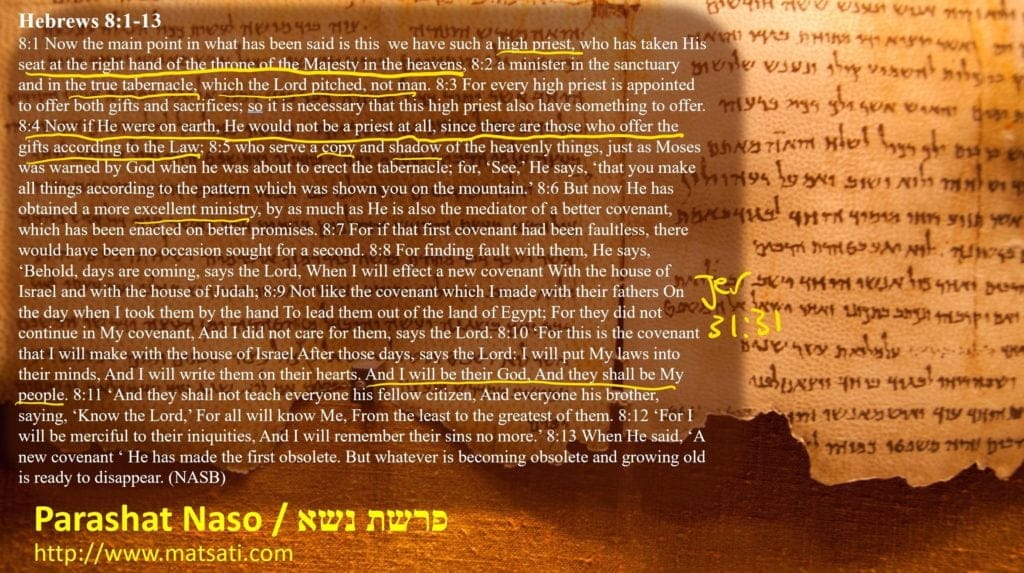
אִגֶּרֶת אֶל הָעִבְרִים ח
עִקַּר הַדְּבָרִים שֶׁנֶּאֶמְרוּ הוּא׃ יֵשׁ לָנוּ כֹּהֵן גָּדוֹל הַיּוֹשֵׁב לִימִין כִּסֵּא הַגְּדֻלָּה בַּשָּׁמַיִם,וְהוּא מְשָׁרֵת בַּקֹּדֶשׁ וּבַמִּשְׁכָּן הָאֲמִתִּי אֲשֶׁר כּוֹנֵן אֱלֹהִים וְלֹא אָדָם.כָּל כֹּהֵן גָּדוֹל תַּפְקִידוֹ לְהַקְרִיב מְנָחוֹת וּזְבָחִים; לָכֵן צָרִיךְ שֶׁגַּם זֶה יִהְיֶה לוֹ מַה לְּהַקְרִיב. אִלּוּ הָיָה בָּאָרֶץ לֹא הָיָה כֹּהֵן, כִּי יֵשׁ פֹּה כֹּהֲנִים הַמַּקְרִיבִים מְנָחוֹת לְפִי הַתּוֹרָהוּמְשָׁרְתִים בַּקֹּדֶשׁ לְפִי תַּבְנִית וְצֵל שֶׁל הַדְּבָרִים הַשְּׁמֵימִיִּים, כְּפִי שֶׁצֻּוָּה מֹשֶׁה בְּבוֹאוֹ לְהָקִים אֶת הַמִּשְׁכָּן; הֵן אָמַר אֵלָיו, ״רְאֵה וַעֲשֵׂה הַכֹּל כְּתַבְנִית אֲשֶׁר–אַתָּה מָרְאֶה בָּהָר.״וְהִנֵּה יֵשׁוּעַ הִשִּׂיג כְּהֻנָּה נַעֲלָה יוֹתֵר, בְּאוֹתָהּ מִדָּה שֶׁהוּא מְתַוֵּךְ שֶׁל בְּרִית מְעֻלָּה יוֹתֵר אֲשֶׁר נוֹסְדָה עַל הַבְטָחוֹת טוֹבוֹת יוֹתֵר.אִלּוּ הָיְתָה הַבְּרִית הָרִאשׁוֹנָה בְּלִי חִסָּרוֹן, לֹא הָיָה נִדְרָשׁ מָקוֹם לַשְּׁנִיָּה.הֲלֹא בְּהוֹכִיחוֹ אוֹתָם הוּא אוֹמֵר׃ ״הִנֵּה יָמִים בָּאִים, נְאֻם–יהוה, וְכָרַתִּי אֶת–בֵּית יִשְׂרָאֵל וְאֶת–בֵּית יְהוּדָה בְּרִית חֲדָשָׁה;לֹא כַבְּרִית אֲשֶׁר כָּרַתִּי אֶת–אֲבוֹתָם בְּיוֹם הֶחֱזִיקִי בְיָדָם לְהוֹצִיאָם מֵאֶרֶץ מִצְרַיִם, אֲשֶׁר–הֵמָּה הֵפֵרוּ אֶת–בְּרִיתִי וְאָנֹכִי בָּחַלְתִּי בָם, נְאֻם–יהוה.כִּי זֹאת הַבְּרִית אֲשֶׁר אֶכְרֹת אֶת–בֵּית יִשְׂרָאֵל אַחֲרֵי הַיָּמִים הָהֵם, נְאֻם–יהוה׃ נָתַתִּי אֶת–תּוֹרָתִי בְּקִרְבָּם וְעַל–לִבָּם אֶכְתֳּבֶנָּה, וְהָיִיתִי לָהֶם לֵאלֹהִים וְהֵמָּה יִהְיוּ–לִי לְעָם,וְלֹא יְלַמְּדוּ עוֹד אִישׁ אֶת–רֵעֵהוּ וְאִישׁ אֶת–אָחִיו לֵאמֹר, דְּעוּ אֶת יהוה; כִּי כוּלָּם יֵדְעוּ אוֹתִי לְמִקְּטַנָּם וְעַד–גְּדוֹלָם.כִּי אֶסְלַח לַעֲוֹנָם, וּלְחַטָּאתָם לֹא אֶזְכָּר–עוֹד.״הִנֵּה בְּאָמְרוֹ בְּרִית חֲדָשָׁה יִשֵּׁן אֶת הָרִאשׁוֹנָה וּמַה שֶּׁנוֹשָׁן וּמַזְקִין קָרוֹב לַחֲלֹף.
Hebrews 8:1-13
8:1 Now the main point in what has been said is this we have such a high priest, who has taken His seat at the right hand of the throne of the Majesty in the heavens, 8:2 a minister in the sanctuary and in the true tabernacle, which the Lord pitched, not man. 8:3 For every high priest is appointed to offer both gifts and sacrifices; so it is necessary that this high priest also have something to offer. 8:4 Now if He were on earth, He would not be a priest at all, since there are those who offer the gifts according to the Law; 8:5 who serve a copy and shadow of the heavenly things, just as Moses was warned by God when he was about to erect the tabernacle; for, ‘See,’ He says, ‘that you make all things according to the pattern which was shown you on the mountain.’ 8:6 But now He has obtained a more excellent ministry, by as much as He is also the mediator of a better covenant, which has been enacted on better promises. 8:7 For if that first covenant had been faultless, there would have been no occasion sought for a second. 8:8 For finding fault with them, He says, ‘Behold, days are coming, says the Lord, When I will effect a new covenant With the house of Israel and with the house of Judah; 8:9 Not like the covenant which I made with their fathers On the day when I took them by the hand To lead them out of the land of Egypt; For they did not continue in My covenant, And I did not care for them, says the Lord. 8:10 ‘For this is the covenant that I will make with the house of Israel After those days, says the Lord: I will put My laws into their minds, And I will write them on their hearts. And I will be their God, And they shall be My people. 8:11 ‘And they shall not teach everyone his fellow citizen, And everyone his brother, saying, ‘Know the Lord,’ For all will know Me, From the least to the greatest of them. 8:12 ‘For I will be merciful to their iniquities, And I will remember their sins no more.’ 8:13 When He said, ‘A new covenant ‘ He has made the first obsolete. But whatever is becoming obsolete and growing old is ready to disappear. (NASB)
It is very important to carefully read the first 5 verses in Hebrews 8. We are told specifically in Hebrews 8:4-5, אִלּוּ הָיָה בָּאָרֶץ לֹא הָיָה כֹּהֵן, כִּי יֵשׁ פֹּה כֹּהֲנִים הַמַּקְרִיבִים מְנָחוֹת לְפִי הַתּוֹרָהוּמְשָׁרְתִים בַּקֹּדֶשׁ לְפִי תַּבְנִית וְצֵל שֶׁל הַדְּבָרִים הַשְּׁמֵימִיִּים, כְּפִי שֶׁצֻּוָּה מֹשֶׁה בְּבוֹאוֹ לְהָקִים אֶת הַמִּשְׁכָּן; הֵן אָמַר אֵלָיו, ״רְאֵה וַעֲשֵׂה הַכֹּל כְּתַבְנִית אֲשֶׁר–אַתָּה מָרְאֶה בָּהָר.״ 8:4 Now if He were on earth, He would not be a priest at all, since there are those who offer the gifts according to the Law; 8:5 who serve a copy and shadow of the heavenly things, just as Moses was warned by God when he was about to erect the tabernacle; for, ‘See,’ He says, ‘that you make all things according to the pattern which was shown you on the mountain.’ (NASB) What is significant about these verses are that if Yeshua was here on earth, he would not be a priest at all! This is stated explicitly in Hebrews 8:4. This means that the order of Melchizedek (see Bereshit / Genesis 14) does not supersede the Levitical priesthood and the earthly copy. This also means that what Yeshua did for us in purification from sin and the new covenant did not do away with the Temple service or its activities. In fact, we are told all of creation groans (Romans 8:22) for its redemption which more or less proves this was accomplished in heaven. The implication is that if the Temple were rebuilt, we could not simply say that we are cleansed in Yeshua the Messiah and are able to just walk on up into the Temple area. The reason being according to Hebrews 8:4-5 that is not what Yeshua did on our behalf. The point of the author of Hebrews in his statement from 8:13 When He said, ‘A new covenant ‘ He has made the first obsolete. But whatever is becoming obsolete and growing old is ready to disappear. (NASB) is on what was so inferior to the first covenant as opposed to the second covenant. The first covenant did not deal directly with the purification of the inward man (what is on the inside), the earthly Tabernacle only dealt with the external aspects of impurity. This is what Yeshua was speaking of when he said what he did according to Mark 7:20-21. We also note how this is true based upon sin remaining a universal property of this fallen world, whereby we all will die physically. This also answers what Yeshua meant by being born spiritually (John 3) as a matter of faith and truth in the Messiah. The new covenant did not remove the aspect of the curse in the sense of death to the body or the effects of sin here on earth. The new covenant dealt with the cleansing in heaven and being purified, redeemed, and made whole before our Father who is in heaven! This is what it means that we have such a wonderful salvation! This is also what it means that as having now been sanctified in heaven we are to walk in that sanctification here on earth! This is what Yeshua has done, He did it and it is finished! This purification before God is what it means to be sanctified and set apart, as Hebrews 10:14 states, “For by one sacrifice he has made perfect forever those who are being made holy.” This is a completed thing in heaven, but a progressive thing here on earth as we are being perfected as living our lives for God’s glory and the power of God in our lives to overcome sin! This is what Paul wrote what he did about running the race and wining the prize. Much more could actually be said about these things, which explain why the Scriptures are written in the way that they are! Because of what Yeshua has done, our Father looks upon each one of us as wholly accepted and perfected in His Son in heaven. These things explain what we see going on in this world, and even in our own lives as we struggle with sin and to live our lives for God’s Glory! And because of these things, we can know without a doubt, that we are able to live in triumph through the power of the presence of God in our lives for His great Glory!
